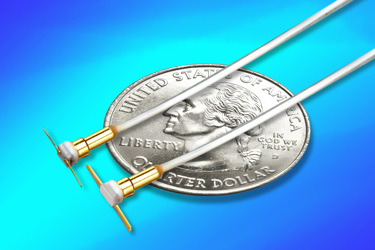Fermionics Opto-Technology Introduces High-Speed InGaAs Photodiodes – FD80 Series

Simi Valley, Calif. –Fermionics Opto-Technology (www.fermionics.com), experts in indium gallium arsenide (InGaAs) photodiodes for a wide variety of applications, introduces the ultra-compact FD80 Series of high-speed, low-dark-current, low-capacitance photodiodes. The innovative InGaAs product line is designed specifically for use in extremely tight spaces, such as high-speed communication systems.
The FD80 series features a planar-passivated device structure with an 80 µm diameter active area on a vertical or horizontal-mount S8 ceramic package pigtail assembly in solderable surface-mount configurations. For added convenience, the high-speed indium gallium arsenide PIN photodiodes are coupled directly to a single- or multi-mode pigtail fiber. The devices are also available with an internal fiber tip angle which is polished for low back reflection, and other customizable options.
To view absolute maximum ratings, optical and electrical characteristics and packaging options for Fermionics FD80 series of ultra-compact pigtail photodiodes, please download the datasheet pdf here: https://fermionics.com/files/FD80series.pdf. To learn more about the company’s full line of InGaAs photodiodes, including other high-speed devices, large area InGaAs photodiodes for instrumentation and sensing applications, and special and custom products, please visit: www.fermionics.com.
ABOUT THE COMPANY:
Fermionics Opto-Technology (www.fermionics.com), specialists in indium gallium arsenide (InGaAs) photodiodes, offers a wide variety of products for optical communications (high-speed analog and digital), test instrumentation, sensing, and medical equipment applications. The company is dedicated to serving its diverse customer base with the highest quality products based on planar-passivated technology, on-time deliveries, and custom design services. Fermionics provides off-the-shelf detectors, specially configured photodiode packages, and/or custom-designed chips to support the most critical photodiode specifications and design requirements.
